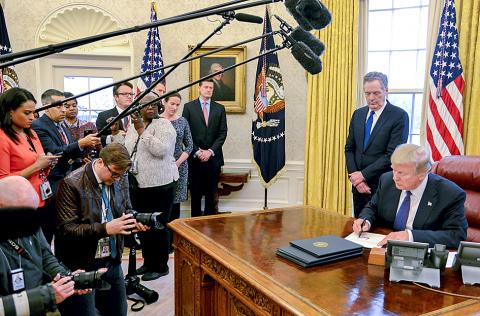The US subsidiary of South Korea’s LG Electronics Co on Wednesday warned retailers that it would raise prices of its washing machines following import duties imposed by US President Donald Trump’s administration this week.
It was the first concrete reaction to the trade measures announced this week that have angered the US’ trading partners.
“As a result of the trade situation, we will be initiating pricing actions,” LG Electronics USA executive vice president of home appliances Thomas Yoon said in a letter to retailers.

Photo: Bloomberg
He said the amount of the price increases would be detailed in separate letters to the stores.
The Wall Street Journal reported that the price hike would be about US$50 on certain washer-dryer combinations.
Trump on Tuesday put his “America First” doctrine into action by imposing duties of 20 to 50 percent on large washing machines manufactured in China, South Korea, Mexico and Vietnam, in addition to a 30 percent tariff on imported solar panels.
Seoul has said it plans to take the issue to the WTO, while Beijing expressed “strong dissatisfaction” with the move adopted to protect US manufacturers. However, LG assured its retailers that supplies of the appliances would not be disrupted.
“While this is disappointing news, let me assure you that we have planned for this possibility so we can minimize any disruption in supply of LG washers and dryers to you, our valued partners,” Yoon wrote.
The South Korean company recently completed construction of a washing machine factory in Clarksville, Tennessee, which it expects to start production in the fourth quarter.
Separately, after imposing tariffs opposed by much of the US solar industry, the Trump administration is offering a US$3 million prize to revive domestic solar manufacturing.
The US Department of Energy on Wednesday said that the American Made Solar Prize would help “reassert American leadership in the solar marketplace.”
Earlier this week, Trump decided to impose tariffs of up to 30 percent on most imported solar cells used in solar panels.
A federal trade panel recommended the tariffs, which had been sought by two US manufacturers.
Most of the US solar industry revolves around installing solar systems for homeowners and utilities, and those companies have largely opposed the tariffs.
They have said that tariffs would raise their costs and make photovoltaic installations less price-competitive with other energy sources.
Additional reporting by AP

MULTIFACETED: A task force has analyzed possible scenarios and created responses to assist domestic industries in dealing with US tariffs, the economics minister said The Executive Yuan is tomorrow to announce countermeasures to US President Donald Trump’s planned reciprocal tariffs, although the details of the plan would not be made public until Monday next week, Minister of Economic Affairs J.W. Kuo (郭智輝) said yesterday. The Cabinet established an economic and trade task force in November last year to deal with US trade and tariff related issues, Kuo told reporters outside the legislature in Taipei. The task force has been analyzing and evaluating all kinds of scenarios to identify suitable responses and determine how best to assist domestic industries in managing the effects of Trump’s tariffs, he

TIGHT-LIPPED: UMC said it had no merger plans at the moment, after Nikkei Asia reported that the firm and GlobalFoundries were considering restarting merger talks United Microelectronics Corp (UMC, 聯電), the world’s No. 4 contract chipmaker, yesterday launched a new US$5 billion 12-inch chip factory in Singapore as part of its latest effort to diversify its manufacturing footprint amid growing geopolitical risks. The new factory, adjacent to UMC’s existing Singapore fab in the Pasir Res Wafer Fab Park, is scheduled to enter volume production next year, utilizing mature 22-nanometer and 28-nanometer process technologies, UMC said in a statement. The company plans to invest US$5 billion during the first phase of the new fab, which would have an installed capacity of 30,000 12-inch wafers per month, it said. The

Taiwan’s official purchasing managers’ index (PMI) last month rose 0.2 percentage points to 54.2, in a second consecutive month of expansion, thanks to front-loading demand intended to avoid potential US tariff hikes, the Chung-Hua Institution for Economic Research (CIER, 中華經濟研究院) said yesterday. While short-term demand appeared robust, uncertainties rose due to US President Donald Trump’s unpredictable trade policy, CIER president Lien Hsien-ming (連賢明) told a news conference in Taipei. Taiwan’s economy this year would be characterized by high-level fluctuations and the volatility would be wilder than most expect, Lien said Demand for electronics, particularly semiconductors, continues to benefit from US technology giants’ effort

‘SWASTICAR’: Tesla CEO Elon Musk’s close association with Donald Trump has prompted opponents to brand him a ‘Nazi’ and resulted in a dramatic drop in sales Demonstrators descended on Tesla Inc dealerships across the US, and in Europe and Canada on Saturday to protest company chief Elon Musk, who has amassed extraordinary power as a top adviser to US President Donald Trump. Waving signs with messages such as “Musk is stealing our money” and “Reclaim our country,” the protests largely took place peacefully following fiery episodes of vandalism on Tesla vehicles, dealerships and other facilities in recent weeks that US officials have denounced as terrorism. Hundreds rallied on Saturday outside the Tesla dealership in Manhattan. Some blasted Musk, the world’s richest man, while others demanded the shuttering of his